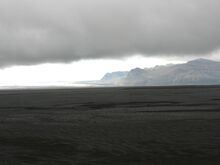About[]

The Land of the Black Sands is an area found in the most southern part of Solhara. Known for its services relating to death, it's a place not entirely acknowledged, but not entirely denied either. At best considered a commonwealth by some, a literal black mark on the land by others, it's general living conditions are believed by many to be abjectly impoverished and unclean. The land itself was formed from an inactive volcano and beneath the black sands itself is volcanic glass.
General History[]
It was said long ago when the sultanate began to recruit young men to work in the mines of Solhara, a small group refused to abide. Valuing their freedom above all else, their rebellious ways were quickly met and opposed as the sultan presented them with a proposition. Either be exiled and practice the unclean professions tainted by death or be wiped from the face of the Earth with their families. And rather than meet their end at the hands of the sultan's army, they were forced to the dark landscape that was known simply as the land of the Black Sands where they became morticians, butchers, executioners, assassins and priests/priestesses of Eunoia the Soul Reaper. As to why this was? It's still debated among historians, storytellers and the residents of Solhara themselves. Children are often told they were given the land, because the black sand did not stain and the sight of blood would not offend visitors, while others claim it was as far south as they could be banished without being thrown into the sea.
Today the land is still one of the less respectable parts of Solhara and a place few visit, making it especially popular among criminals and those forced to go into hiding. Many of their residents are considered to be barbarians and subject to prejudice for their unclean practices. But they still are involved with trade with the rest of the kingdoms and still remains a popular place for the dead to be burned and disposed of in the wake of the blight to prevent the infection from spreading.
Culture[]
Because of the nature of their exile, it's said that their culture has evolved to reflect their ghoulish professions. Many of their residents have been known to worship Eunoia the Soul Reaper and tend to look on the darker side of life.
Craftsmen and artisans of the land of the black sands are known for their work with "animal bones." Sold cheap and finely crafted, it's considered to be one of their main exports and been used to make figures, game pieces, utensils, tools and even faux-ivory jewelry. But rarely will a Solharan merchant tell you what kind of animal his goods were made from. And while cheap to export, many of the residents are unhappy with the tariffs imposed upon them by the sultanate for importing goods, believing them to be too expensive and forcing them to rely on smugglers.
One of their most famous customs is burial of their own dead. Before the mandate that all bodies be burned to prevent the spread of the walking starvation,it was said that the depth of a grave directly corresponded to a family's wealth. Because some people were too poor to buy a plot, many graveyards rented them out to the families of the deceased. When they stopped paying, the dead are dug up and shamed. Usually if a family is poor, gravediggers didn't go deeper than 3' as to save them the trouble of digging them up again.
Popular Phrases/Dialect:
- "May the reapers take you" - A curse upon an enemy
- "Salam" - Meaning "peace" it's a traditional greeting,
- "The dead cannot pull a plow" - An expression usually usually used in context when a grave is no longer paid for.
- "May the reapers pass you by" - A traditional blessing
- "Good health, good life, go in peace" - A traditional blessing
- "Solharan Wedding Proposal" - When talking to an assassin, it means to kill someone.
Notable Residents[]
- Khartoum:A mad sorcerer, he was supposedly executed long ago for his crimes against the gods. Considered to be one of the fathers of necromancy, his works and supposed insanity was published in a series of grimoires bound in flesh.
- Destane:A fae-halfling and former mentor at the sortilege, after his mysterious disappearance it was discovered by the order of fate that he had been practicing the dark arts and collecting fae artifacts.
- Mozenrath:A djinn-halfling and a student of Destane, it was said his abilities to harness, read and utilize the black sands of his homeland were unique. Once believed to be involved in the disappearance and possible murder of his mentor, he was acquitted after investigations failed to produce evidence of his involvement. Since then nobody has heard much from the sorcerer and believe he's returned to his ancestral home among the black sands.
- Achmed: Nephew to the sultan and of royal blood, he's considered to be popular among the traditionalists.
Notable Locations[]
- Dagger Rock: A canyon once formed from the last violent eruptions of the volcano, it gets its name from the unusually large chunks of obsidian found throughout the canyon.
- The Citadel: A large temple built in dedication to the death goddess, it was created as a place of worship and a way of appeasing her.
In Other Media[]
Television
The land of the black sands first appeared in Disney's Aladdin the TV Series and served as Mozenrath's base of operations. Having been deserted and forcefully taken from the sorcerer Destane, besides Mozenrath and Xerxes, the only residents seem to be the mamluks and various other henchmen and creatures Mozenrath collected. It's also been revealed that Mozenrath as a security precaution had the city rigged with a series of magical crystals made to sense the use of magic and alarm him of any unauthorized use.
